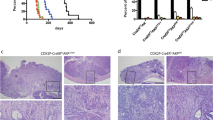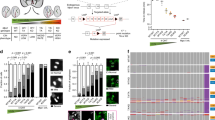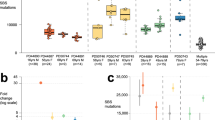Abstract
The ataxia telangiectasia-mutated (ATM) gene has been implicated as an early barrier to the growth and progression of incipient solid tumors. Here, we show that germ-line nullizygosity for the mouse Atm gene significantly increases the proliferative index, net growth rate and multiplicity of intestinal adenomas in two distinct models of familial colon cancer: ApcMin/+ and Apc1638N/+. These effects of Atm deficiency are quantitatively different from deficiency for either of the genomic stability genes Bloom's syndrome helicase or DNA ligase 4, and the effect of Atm loss on tumor multiplicity is largely independent of the effect of ionizing radiation. Furthermore, the loss of heterozygosity rates at the adenomatous polyposis coli (Apc) locus are unaffected by Atm loss. Taken together, these data implicate the Atm gene product as a barrier to dysplastic growth in the early stages of intestinal tumor progression, independent of its effects on genomic stability.
This is a preview of subscription content, access via your institution
Access options
Subscribe to this journal
Receive 50 print issues and online access
$259.00 per year
only $5.18 per issue
Buy this article
- Purchase on Springer Link
- Instant access to full article PDF
Prices may be subject to local taxes which are calculated during checkout


Similar content being viewed by others
References
Amos-Landgraf JM, Kwong LN, Kendziorski CM, Reichelderfer M, Torrealba J, Weichert J et al. (2007). A target-selected Apc-mutant rat kindred enhances the modeling of familial human colon cancer. Proc Natl Acad Sci USA 104: 4036–4041.
Bai AHC, Tong JHM, To KF, Chan MWY, Man EPS, Lo KW et al. (2004). Promoter hypermethylation of tumor-related genes in the progression of colorectal neoplasia. Int J Cancer 112: 846–853.
Barlow C, Hirotsune S, Paylor R, Liyanage M, Eckhaus M, Collins F et al. (1996). Atm-deficient mice: a paradigm of ataxia telangiectasia. Cell 86: 159–171.
Bartkova J, Horejsi Z, Koed K, Kramer A, Tort F, Zieger K et al. (2005). DNA damage response as a candidate anti-cancer barrier in early human tumorigenesis. Nature 434: 864–870.
Bartkova J, Rezaei N, Liontos M, Karakaidos P, Kletsas D, Issaeva N et al. (2006). Oncogene-induced senescence is part of the tumorigenesis barrier imposed by DNA damage checkpoints. Nature 444: 633–637.
Fodde R, Edelmann W, Yang K, van Leeuwen C, Carlson C, Renault B et al. (1994). A targeted chain-termination mutation in the mouse Apc gene results in multiple intestinal tumors. Proc Natl Acad Sci USA 91: 8969–8973.
Frank KM, Sharpless NE, Gao Y, Sekiguchi JM, Ferguson DO, Zhu C et al. (2000). DNA ligase IV deficiency in mice leads to defective neurogenesis and embryonic lethality via the p53 pathway. Mol Cell 5: 993–1002.
Gorgoulis VG, Vassiliou LV, Karakaidos P, Zacharatos P, Kotsinas A, Liloglou T et al. (2005). Activation of the DNA damage checkpoint and genomic instability in human precancerous lesions. Nature 434: 907–913.
Goss KH, Risinger MA, Kordich JJ, Sanz MM, Straughen JE, Slovek LE et al. (2002). Enhanced tumor formation in mice heterozygous for Blm mutation. Science 297: 2051–2053.
Grabsch H, Dattani M, Barker L, Maughan N, Maude K, Hansen O et al. (2006). Expression of DNA double-strand break repair proteins ATM and BRCA1 predicts survival in colorectal cancer. Clin Cancer Res 12: 1494–1500.
Haigis KM, Caya JG, Reichelderfer M, Dove WF . (2002). Intestinal adenomas can develop with a stable karyotype and stable microsatellites. Proc Natl Acad Sci USA 99: 8927–8931.
Haigis KM, Hoff PD, White A, Shoemaker AR, Halberg RB, Dove WF . (2004). Tumor regionality in the mouse intestine reflects the mechanism of loss of Apc function. Proc Natl Acad Sci USA 101: 9769–9773.
Halberg RB, Katzung DS, Hoff PD, Moser AR, Cole CE, Lubet RA et al. (2000). Tumorigenesis in the multiple intestinal neoplasia mouse: redundancy of negative regulators and specificity of modifiers. Proc Natl Acad Sci USA 97: 3461–3466.
Hill R, Song Y, Cardiff RD, Van Dyke T . (2005). Selective evolution of stromal mesenchyme with p53 loss in response to epithelial tumorigenesis. Cell 123: 1001–1011.
Janssen KP, Alberici P, Fsihi H, Gaspar C, Breukel C, Franken P et al. (2006). APC and oncogenic KRAS are synergistic in enhancing Wnt signaling in intestinal tumor formation and progression. Gastroenterology 131: 1096–1109.
Luo G, Santoro IM, McDaniel LD, Nishijima I, Mills M, Youssoufian H et al. (2000). Cancer predisposition caused by elevated mitotic recombination in Bloom mice. Nat Genet 26: 424–429.
Luongo C, Dove WF . (1996). Somatic genetic events linked to the Apc locus in intestinal adenomas of the Min mouse. Genes Chromosomes Cancer 17: 194–198.
Mann MB, Hodges CA, Barnes E, Vogel H, Hassold TJ, Luo G . (2005). Defective sister-chromatid cohesion, aneuploidy and cancer predisposition in a mouse model of type II Rothmund–Thomson syndrome. Hum Mol Genet 14: 813–825.
Matsuoka S, Rotman G, Ogawa A, Shiloh Y, Tamai K, Elledge SJ . (2000). Ataxia telangiectasia-mutated phosphorylates Chk2 in vivo and in vitro. Proc Natl Acad Sci USA 97: 10389–10394.
Rao CV, Yang YM, Swamy MV, Liu T, Fang Y, Mahmood R et al. (2005). Colonic tumorigenesis in BubR1+/−ApcMin/+ compound mutant mice is linked to premature separation of sister chromatids and enhanced genomic instability. Proc Natl Acad Sci USA 102: 4365–4370.
Renwick A, Thompson D, Seal S, Kelly P, Chagtai T, Ahmed M et al. (2006). ATM mutations that cause ataxia-telangiectasia are breast cancer susceptibility alleles. Nat Genet 38: 873–875.
Savitsky K, Bar-Shira A, Gilad S, Rotman G, Ziv Y, Vanagaite L et al. (1995). A single ataxia telangiectasia gene with a product similar to PI-3 kinase. Science 268: 1749–1753.
Sharpless NE, Ferguson DO, O'Hagan RC, Castrillon DH, Lee C, Farazi PA et al. (2001). Impaired nonhomologous end-joining provokes soft tissue sarcomas harboring chromosomal translocations, amplifications, and deletions. Mol Cell 8: 1187–1196.
Sugai T, Habano W, Uesugi N, Jiao YF, Nakamura S, Yoshida T et al. (2001). Frequent allelic imbalance at the ATM locus in DNA multiploid colorectal carcinomas. Oncogene 20: 6095–6101.
Taketo MM . (2006). Mouse models of gastrointestinal tumors. Cancer Sci 97: 355–361.
Westphal CH, Rowan S, Schmaltz C, Elson A, Fisher DE, Leder P . (1997). atm and p53 cooperate in apoptosis and suppression of tumorigenesis, but not in resistance to acute radiation toxicity. Nat Genet 16: 397–401.
Acknowledgements
We thank Caroline Alexander for discussions and Linda Clipson for critical reading and editing of the manuscript. Allan Bradley and Frederick Alt generously provided key mouse strains. This work was supported by the National Cancer Institute (NCI) training grant CA009135 to LNK and by NCI grant R37CA63677.
Author information
Authors and Affiliations
Corresponding author
Rights and permissions
About this article
Cite this article
Kwong, L., Weiss, K., Haigis, K. et al. Atm is a negative regulator of intestinal neoplasia. Oncogene 27, 1013–1018 (2008). https://doi.org/10.1038/sj.onc.1210708
Received:
Revised:
Accepted:
Published:
Issue Date:
DOI: https://doi.org/10.1038/sj.onc.1210708
Keywords
This article is cited by
-
The path to metastatic mouse models of colorectal cancer
Oncogene (2018)
-
Loss of ATM accelerates pancreatic cancer formation and epithelial–mesenchymal transition
Nature Communications (2015)
-
ATM signalling and cancer
Oncogene (2014)
-
A bioinformatical and functional approach to identify novel strategies for chemoprevention of colorectal cancer
Oncogene (2011)
-
The pro-apoptotic K-Ras 4A proto-oncoprotein does not affect tumorigenesis in the Apc Min/+mouse small intestine
BMC Gastroenterology (2008)



